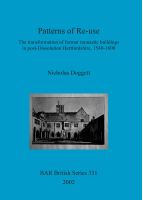Description
BOOK DESCRIPTIONThe adaptive re-use of English monastic buildings in the second half of the 16th century has been relatively little studied. With a few notable exceptions, it has been generally assumed that most former monastic sites were simply plundered for their building materials. Two new approaches suggest that frequently this was not so. First, by examining in detail all the monastic houses of a single county - in this case Hertfordshire - which survived until the Dissolution, and, secondly, by treating the surviving architectural evidence as a primary source, it can be shown that much medieval fabric is, in fact, incorporated in later houses on monastic sites, even when this is not readily apparent. Coupled with contemporary documentary records and later antiquarian accounts, this structural analysis allows a reconstruction to be made of the processes of re-use in the half-century after the Dissolution. The author features 13 detailed case studies of important properties.











